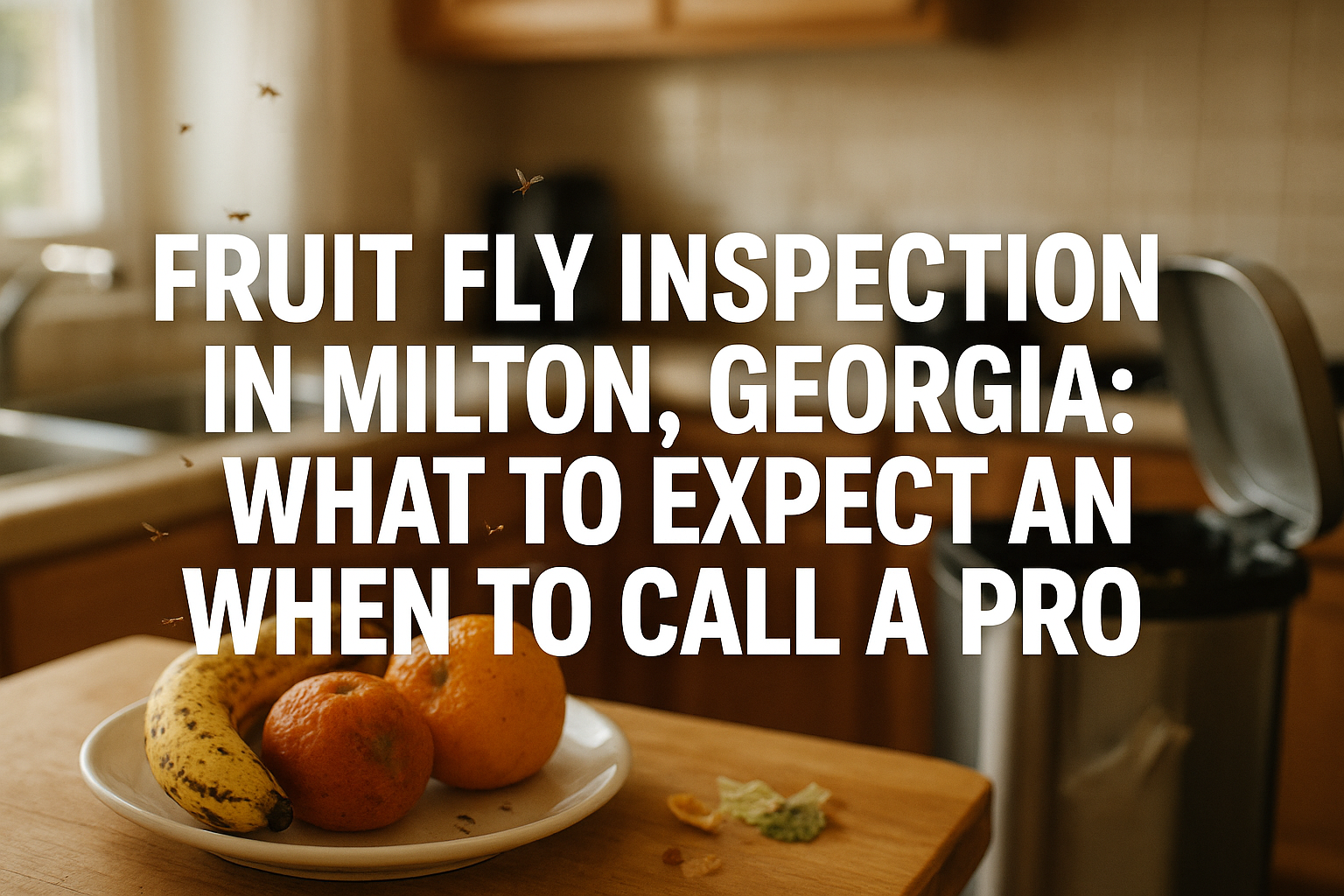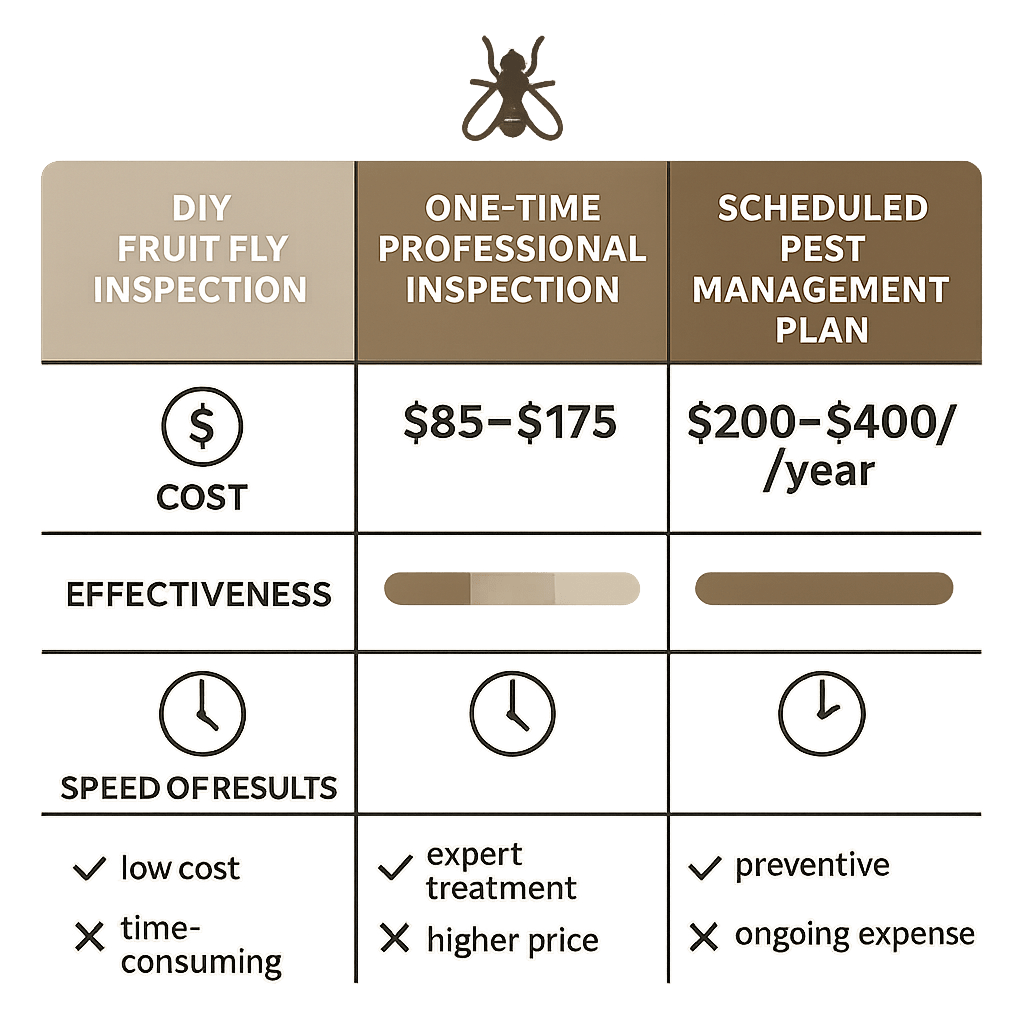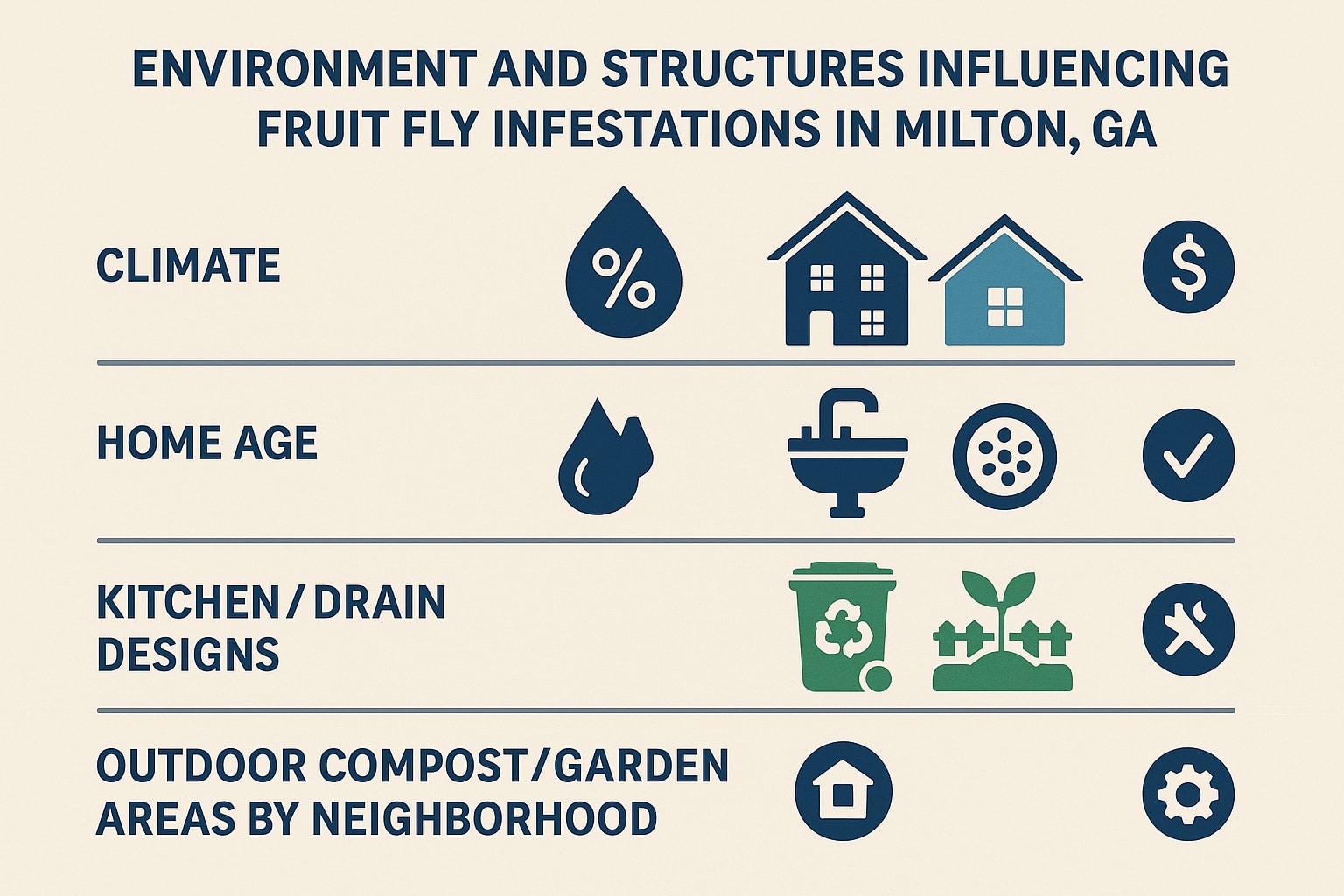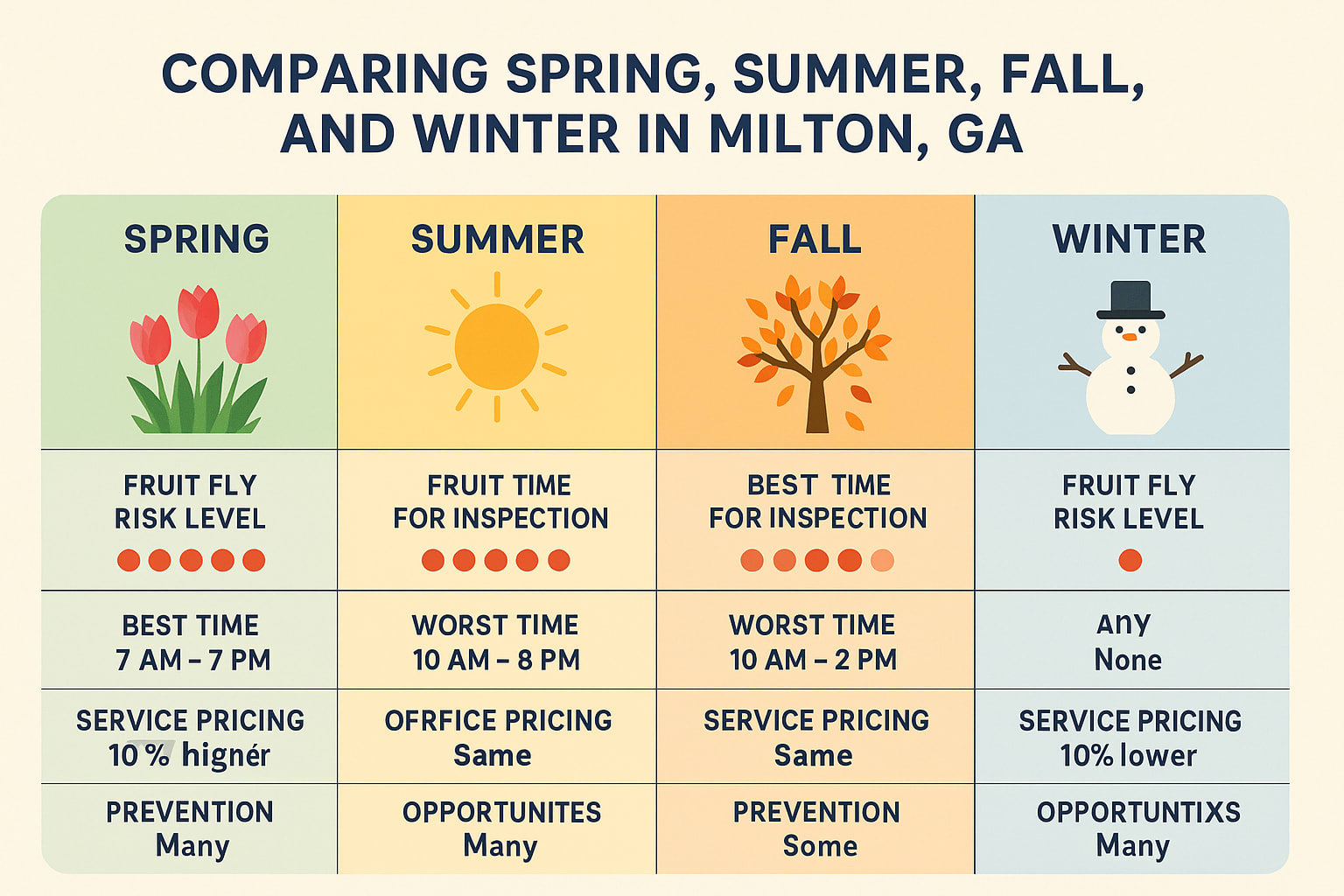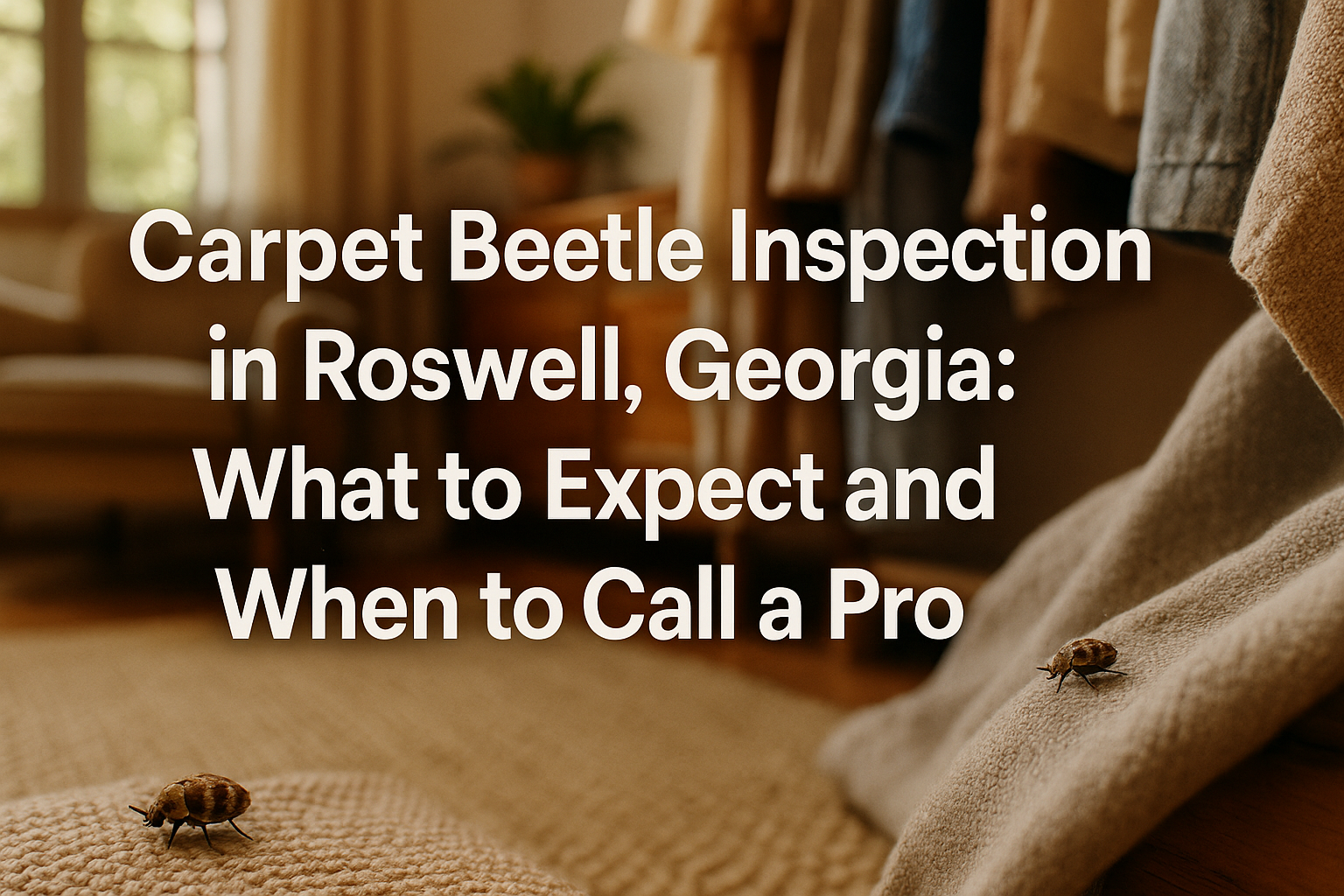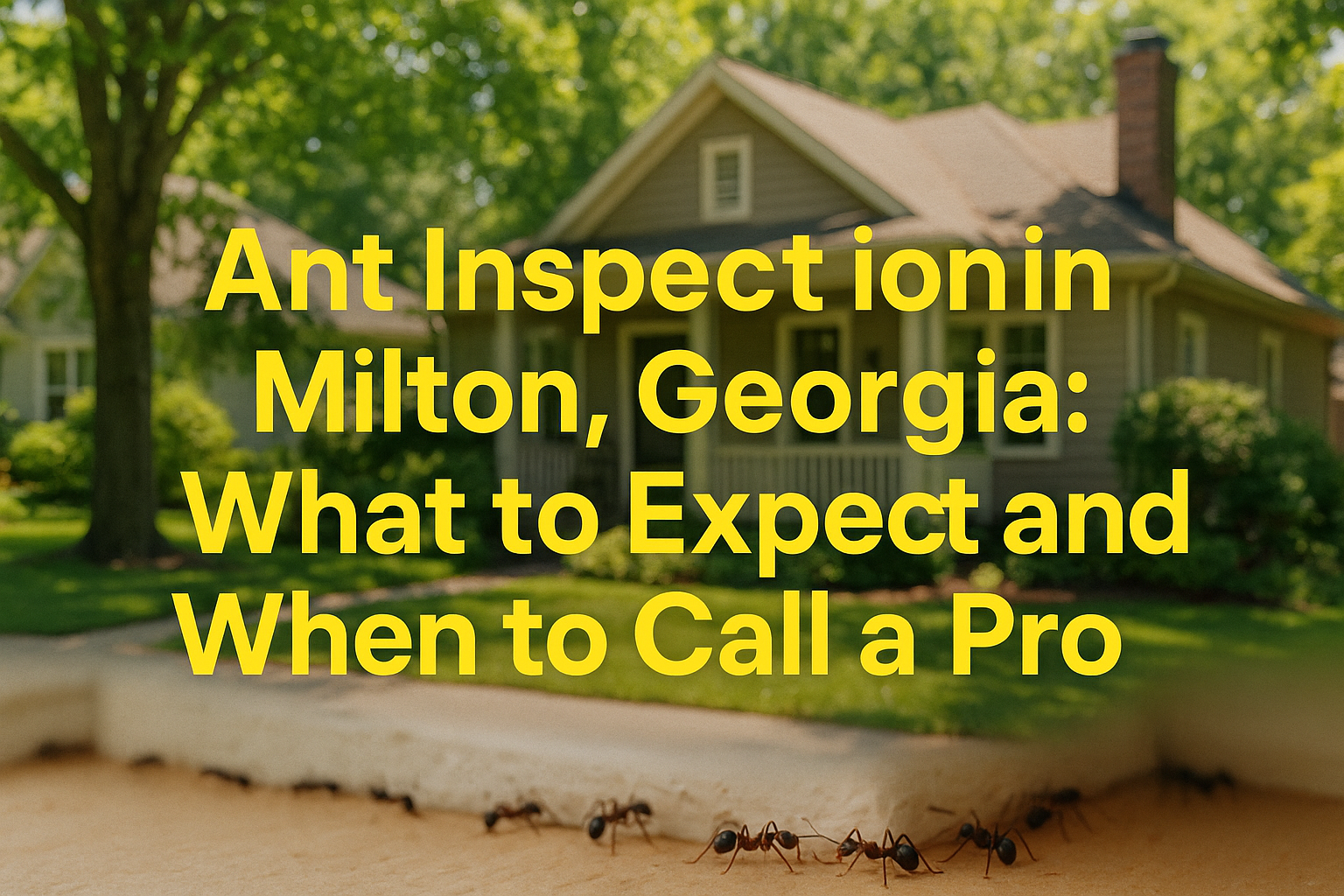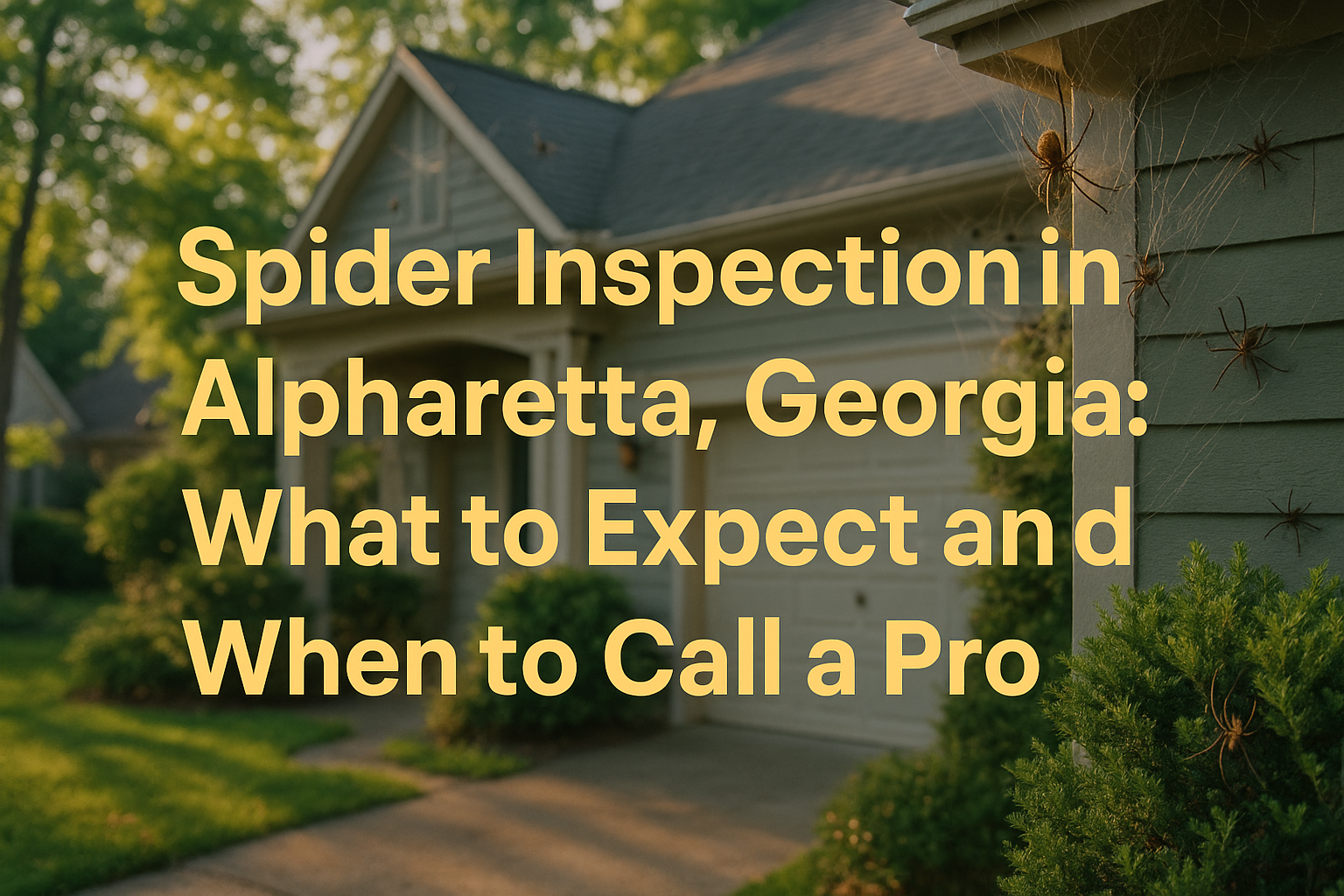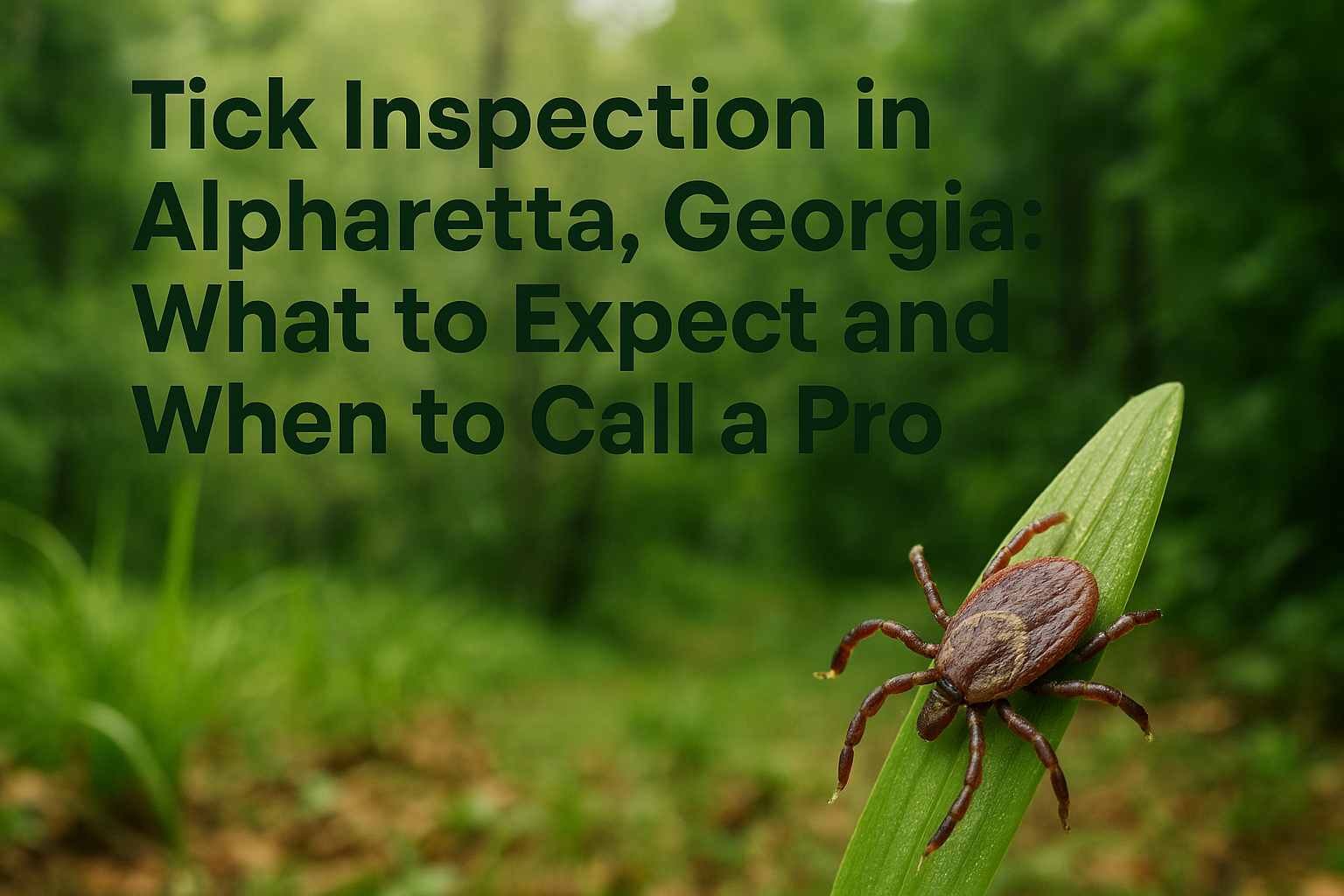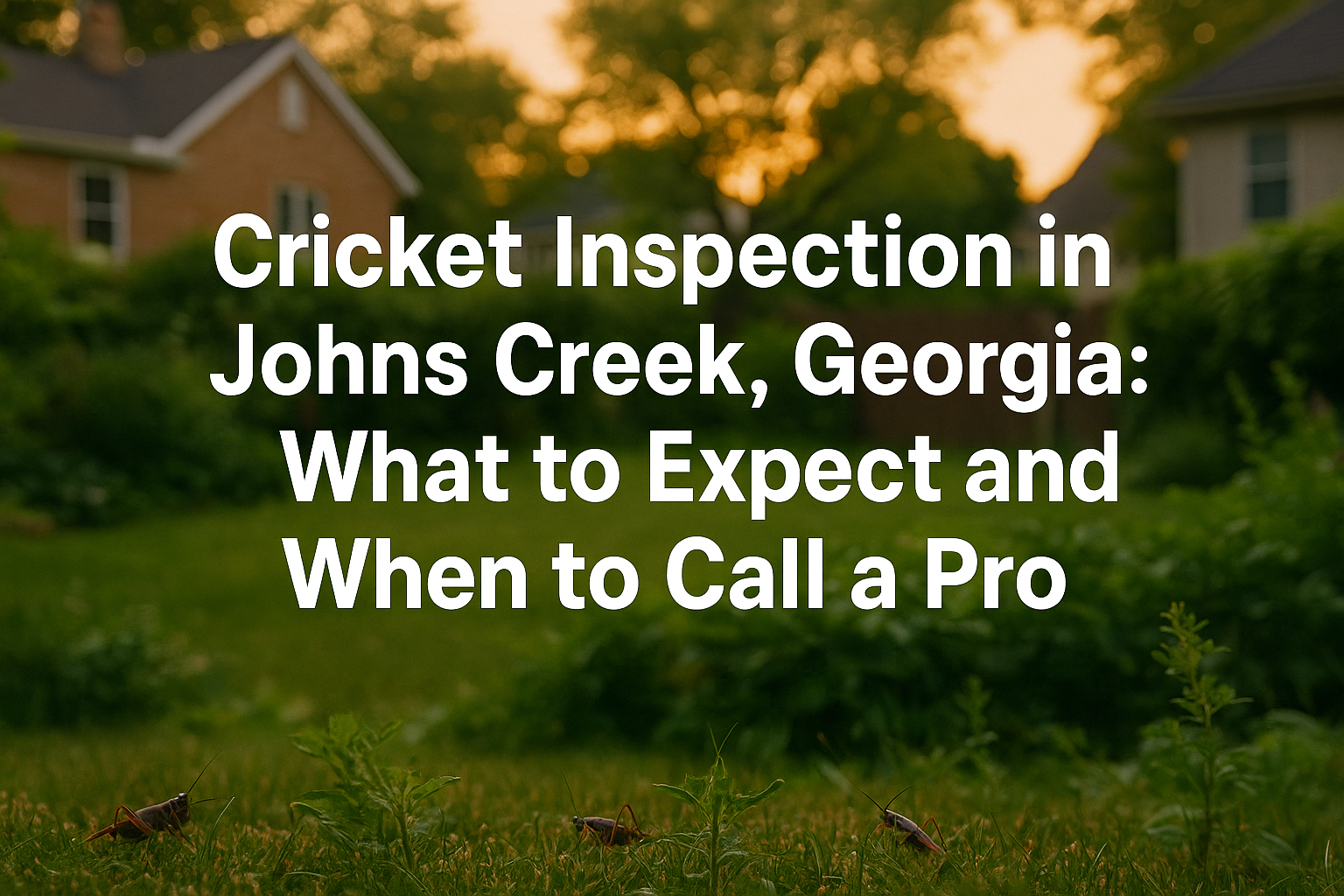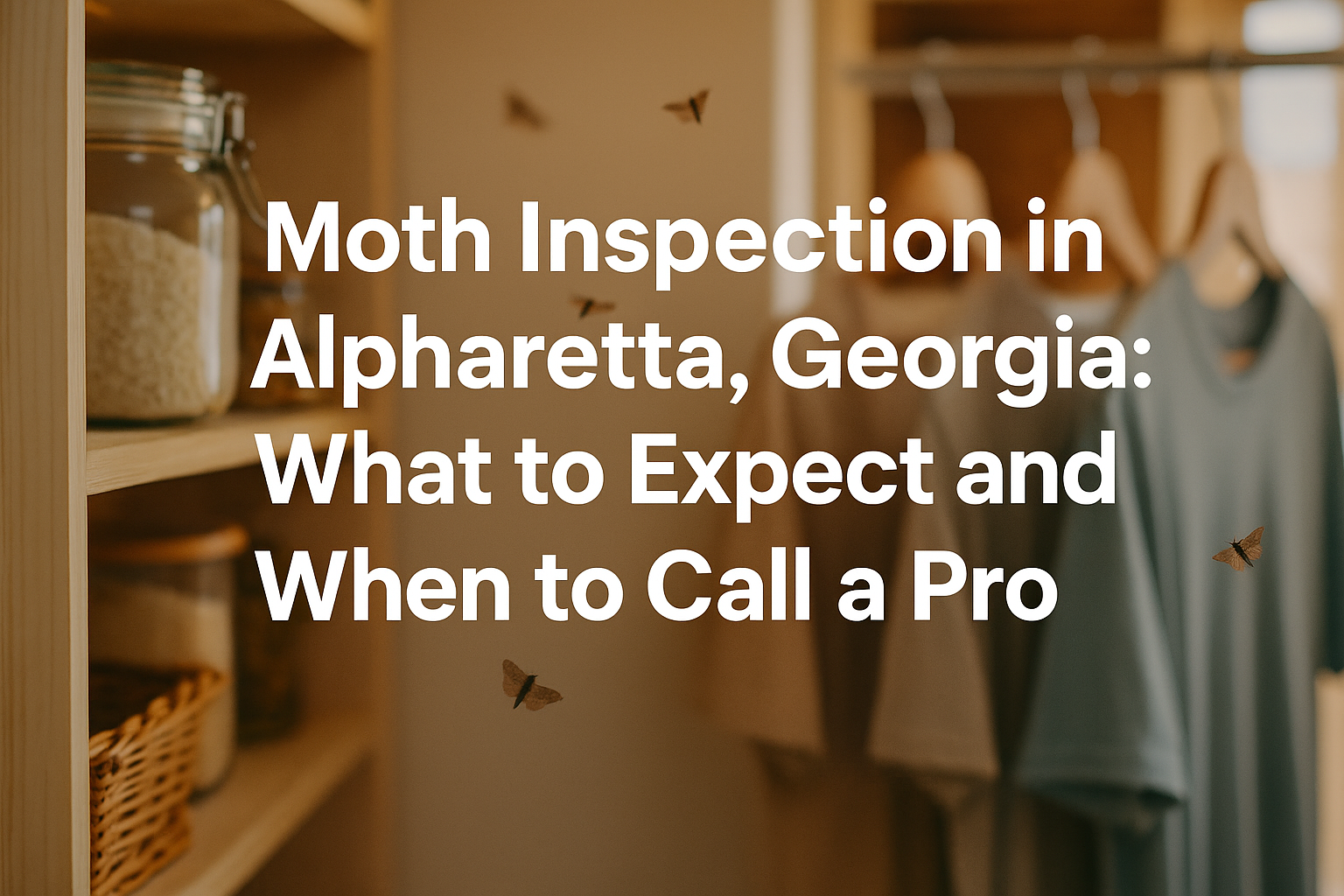Fruit Flies: Why They’re Buzzing Around Milton Kitchens
Fruit Fly Inspection Milton is a growing concern for local homeowners and businesses who’ve battled tiny flying bugs around their kitchens. If you’ve ever chased tiny flying bugs around your kitchen, you already know how annoying fruit flies can be. Here in Milton, GA, these persistent pests show up fast—thanks to our warm, humid weather and the amount of fresh produce around homes, restaurants, and stores. Whether you live near Providence Lake or own a shop in Crabapple, every neighborhood in Milton deals with fruit flies at some point.
Fruit flies love kitchens, pantries, trash cans, and anywhere overripe fruit, food scraps, or moisture collect. Within days, one or two flies can turn into a big cloud, making everything feel less clean and inviting. For local restaurants, grocery stores, and food businesses, these pests can cause even bigger headaches—hurting reputations or putting health standards at risk.
Ignoring a fruit fly problem rarely makes it go away. Letting things slide only means more flies, more frustration, and ongoing sanitation worries. The good news: getting ahead of the problem with a professional inspection usually costs between $85 and $175 here in Milton. More complicated infestations or larger spaces might need extra visits, but a local pro can help you get it under control and keep it that way.
This guide breaks down what you need to know if fruit flies have moved in (or you want to make sure they don’t): how inspections work, what really drives costs up or down, and the best steps you can take to prevent fruit flies from coming back. Ready to breathe easier at home or protect your business? Read on for straightforward advice from the local experts who know Milton best.
What Impacts the Cost of Fruit Fly Inspection Milton?
If you’ve spotted fruit flies buzzing around your home or business in Milton, GA, you’re probably wondering what kind of bill you’ll be looking at for a professional inspection—and why prices can swing so much. Let’s break down the real-world factors that decide what you’ll pay.
- How Big Is the Problem?
In most cases, if the fruit fly problem is only in one place—say, your kitchen or a single breakroom—the inspection will be easier and lower cost. If those little pests are running wild through multiple rooms, or you’re dealing with a restaurant or office, the job gets bigger and so does the price tag. - Severity and Urgency
A small, new fruit fly problem is usually simpler (and cheaper) to tackle. If the flies have really settled in, or you need someone out this afternoon in a rush, expect the cost to tick up. Multiple visits or emergency response adds labor and resources. - Inspection and Treatment Methods
Not every inspection is the same. The classic, walk-through-and-look inspection is the base price. If you need drain checks, monitoring traps, or expert testing (like tracing pipes for breeding spots), that requires more work and sometimes special tools. Plus, some treatment plans—whether it’s advice on cleaning, advanced baits, or eco-friendly options—can affect your total. - Your Neighborhood & Property Type
The layout and age of your property make a difference. Large custom homes in Providence Lake versus an older cottage closer to Highway 9 may mean extra time hunting down hidden breeding areas. Downtown Crabapple businesses often have health codes and more complex setups, leading to higher inspection costs. Even older plumbing or infrastructure can complicate things and impact the final fee.
Generally, most residential fruit fly inspections around Milton land between $85 and $175, depending on your unique situation. Businesses or commercial kitchens can expect rates on the higher end, especially if you’re dealing with bigger spaces or tighter industry regulations.
The bottom line? The best way to budget is to get a local quote from a reputable pest control pro familiar with Milton neighborhoods. Fruit fly issues are never one-size-fits-all, but a clear explanation of these cost factors means there shouldn’t be any expensive surprises.
What Impacts the Cost of Fruit Fly Inspections in Milton?
If you’ve spotted fruit flies buzzing around your home or business in Milton, GA, you’re probably wondering what kind of bill you’ll be looking at for a professional inspection—and why prices can swing so much. Let’s break down the real-world factors that decide what you’ll pay.
- How Big Is the Problem?
In most cases, if the fruit fly problem is only in one place—say, your kitchen or a single breakroom—the inspection will be easier and lower cost. If those little pests are running wild through multiple rooms, or you’re dealing with a restaurant or office, the job gets bigger and so does the price tag. - Severity and Urgency
A small, new fruit fly problem is usually simpler (and cheaper) to tackle. If the flies have really settled in, or you need someone out this afternoon in a rush, expect the cost to tick up. Multiple visits or emergency response adds labor and resources. - Inspection and Treatment Methods
Not every inspection is the same. The classic, walk-through-and-look inspection is the base price. If you need drain checks, monitoring traps, or expert testing (like tracing pipes for breeding spots), that requires more work and sometimes special tools. Plus, some treatment plans—whether it’s advice on cleaning, advanced baits, or eco-friendly options—can affect your total. - Your Neighborhood & Property Type
The layout and age of your property make a difference. Large custom homes in Providence Lake versus an older cottage closer to Highway 9 may mean extra time hunting down hidden breeding areas. Downtown Crabapple businesses often have health codes and more complex setups, leading to higher inspection costs. Even older plumbing or infrastructure can complicate things and impact the final fee.
Generally, most residential fruit fly inspections around Milton land between $85 and $175, depending on your unique situation. Businesses or commercial kitchens can expect rates on the higher end, especially if you’re dealing with bigger spaces or tighter industry regulations.
The bottom line? The best way to budget is to get a local quote from a reputable pest control pro familiar with Milton neighborhoods. Fruit fly issues are never one-size-fits-all, but a clear explanation of these cost factors means there shouldn’t be any expensive surprises.
Why Fruit Flies Love Milton — And Why Every Home Is Different
If you’ve ever wondered why fruit flies seem to show up so quickly in your kitchen or business, a big part of the answer is Milton’s environment. Between the steamy summer weather, all the rain we get, and those gorgeous, leafy neighborhoods, fruit flies thrive here. Green spaces mean more spots for these pests to find food and moisture—and you might not realize just how much that affects things indoors.
Many homes around The Manor or Clarity Farm are surrounded by beautiful landscaping and mature trees, but that outdoor beauty can bring extra humidity and organic debris right up to your doors and windows. Add in aging pipes, older kitchen designs, or compost bins close to the house, and you’ve got prime real estate for fruit flies to breed. Drains with just a little bit of gunk will keep them coming back, and once they’re inside, they multiply fast.
Even newer builds aren’t immune. Sure, modern construction usually helps, but all it takes is a small kitchen gap, a missed crumb, or a stubborn food scrap behind the oven to get a fruit fly party started. In commercial kitchens and restaurants, especially in bustling stretches like Birmingham Crossroads or up near Crabapple, the mix of food waste and high traffic keeps things challenging. Complex prep and disposal systems can hide just enough food and moisture to keep these pests busy year-round.
What does all this mean for you? Well, no two homes (or businesses) in Milton are exactly the same—one might have a hidden plumbing leak, another a row of compost bins near the kitchen door. That’s why costs and treatment plans can look different even if you’re just a street apart. Your neighbor’s simple fix might not tackle your fruit fly issue, and vice versa.
Understanding how Milton’s unique combination of weather, landscape, and building features shapes your fruit fly problems is the first step to getting real, lasting results. The solution has to fit your property, and sometimes that means a bit of extra detective work to find those hidden breeding spots. Next, we’ll show exactly how the environment and structure shape both the complexity and cost of keeping fruit flies out—for good.
Practical Tips to Keep Fruit Flies Out (and Your Wallet Happy)
Anyone who’s dealt with fruit flies knows just how fast they can show up out of nowhere. Luckily, protecting your kitchen and saving some future cash doesn’t have to be a hassle. Here’s what the pros (and even the CDC) recommend to keep these tiny intruders away for good:
- Don’t let produce linger. Cut out anything that’s starting to go mushy and toss it as soon as possible. If you’re not eating fruit that day, pop it in the fridge. Fruit flies love an all-you-can-eat counter spread.
- Wipe counters (and everywhere else!) each day. Every crumb and drip is fair game for fruit flies, so grab a cloth and give prep areas, under toasters, and any nooks a good wipe-down.
- Clean drains and disposals weekly. Even a tiny bit of gunk in drains is enough to draw them in. Use a stiff brush and mild cleaner—no need for fancy sprays. And don’t let water puddle up.
- Take the trash out every night—seriously. Especially in hot months, make a nightly habit of emptying the kitchen garbage. Tight-fitting lids work wonders, too.
- Chill your fruits and veggies. The fridge isn’t just for leftovers. The colder temps slow down ripening and keep fruit flies out of reach.
- Seal every gap and crack. Caulk around windows, doors, and pipes so those little guys don’t have an easy way inside.
These simple habits can stop fruit flies in their tracks and genuinely help cut down on how often you need professional inspection or treatment. A few minutes each day can save your peace of mind—and your budget—later on.
Stick around for our next section, where we’ll show you the best times of year to ramp up your prevention efforts and stay ahead of fruit fly season.
When’s the Best Time to Schedule a Fruit Fly Inspection in Milton?
If you want to keep fruit flies from getting the upper hand in your Milton home, timing really is everything. The absolute best time to get ahead of them is just before things start warming up—think late March through early June. As soon as the temperatures climb, fruit flies find every excuse to pop up in your kitchen, pantry, or breakroom, taking full advantage of the season’s warmth and increased available food sources. Booking an inspection early in spring helps you catch those early breeders before they explode into a bigger headache by July.
Milton homeowners have noticed that as soon as we get those first warm days, fruit fly activity ramps up fast. That’s especially true in neighborhoods like Crooked Creek and The Manor, where fresh produce, home gardens, and active kitchens are common. Those who schedule their inspections earlier in the season almost always see fewer issues and need less treatment overall. The lesson? Don’t wait until mid-summer when everyone’s booking up pest pros—slots fill quickly, turnaround times stretch out, and sometimes prices nudge up during the busiest weeks.
Winter and late fall, on the other hand, tend to be much quieter. Fruit fly activity drops off, which usually means lower service rates and easier scheduling. If you run a busy kitchen or food business, or if you just want guaranteed peace of mind, consider a regular inspection every six months—one at the tail end of winter and another in midsummer should cover your bases all year round.
- Spring: Best time for proactive inspections; catch problems before they multiply.
- Summer: High risk and high demand; act early if you haven’t booked already.
- Fall/Winter: Lower risk; often lower cost for routine checks.
If fruit flies have taught Milton residents anything, it’s that timing really matters. A little bit of early action goes a long way to keeping your home (or business) comfortable and fruit fly-free, season after season.
Get Your Free Fruit Fly Assessment Today
Fruit flies can quickly turn your life upside down, but you don’t have to put up with them for another day. At Anthem Pest Control, we’re all about honest service and local know-how. If you’re in Milton and tired of battling fruit flies in your kitchen, breakroom, or business, help is just a phone call away.
We’ll send a friendly, licensed pro right to your door for a full inspection—free of charge, no pressure to sign anything. We listen, look for the real cause, and give you straightforward advice based on what’s actually happening in your space. Our solutions are customized for Milton homes and businesses, so you get real results without emptying your wallet.
Why wait for another outbreak? Call us now at 877-371-85196 or book your free quote online. Let us show you how affordable and stress-free fruit fly control can be. Your home or business deserves to be fruit fly-free—let’s make it happen together!
Fruit Fly Inspection Questions Answered for Milton Homeowners
If tiny flies have taken over your kitchen and you’re not sure what you’re dealing with, you’re not alone. Here are answers to the questions we hear most from Milton homeowners when it comes to fruit fly inspections and control.
- How do I tell if I’ve got fruit flies or some other little fly?
Fruit flies are light tan, smaller than a pea, and you’ll often catch them hovering around ripe fruit or your kitchen drains. Other bugs like fungus gnats and drain flies might look similar, but they’re more interested in wet soil or stinky drains. - Can I handle fruit flies myself, or do I need a pro?
If there’s only a handful, a deep clean and tossing out any overripe produce might do the trick. If they keep coming back—even after cleaning—the problem is bigger, and it’s worth calling in the pros. - Where do pest inspectors actually look for fruit flies?
The usual suspects: kitchens, pantries, all drains, under sinks, trash cans (and covers), compost bins, and anywhere food is handled or disposed of. If you’ve got hidden breeding spots, an inspector will find them. - How long will the inspection take?
Most homes in Milton can expect a thorough inspection to last 30 to 60 minutes. Big infestations or commercial kitchens can take longer. - Is fruit fly treatment safe for kids and pets?
Absolutely. The products used are registered with the EPA, and most of the work is about finding, cleaning, and sealing off problem areas—not spraying chemicals everywhere. - Why do the flies keep coming back even after I clean?
They’re crafty. Missed breeding sites like deep drains or behind the fridge are common hiding spots. Professionals have special tools to track them down and make sure they don’t return. - Do you offer guarantees in Milton?
You bet. At Anthem Pest Control, most plans include follow-up visits to ensure your fly problem stays gone. - Should I schedule ongoing service?
If your kitchen is packed with fresh produce, or you run a food business, routine checks are the best way to prevent future fruit fly invasions.
Still have questions? Don’t hesitate to reach out. We’re local, we’re friendly, and we know what it takes to keep Milton homes fruit fly free.

